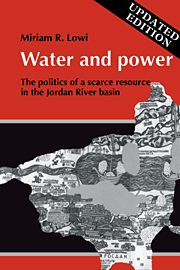Book contents
- Frontmatter
- Contents
- List of illustrations
- List of tables
- Preface
- Preface to the paperback edition
- List of abbreviations
- 1 Introduction: conflict and cooperation in international river basins
- Part I Riparian dilemmas
- Part II The Jordan waters conflict
- Part III The Jordan basin since 1967
- 6 Water and development in Israel and Jordan
- 7 Riparian relations and the perception of conflict
- 8 Riparian disputes since 1967
- 9 Conclusion: The conduct of riparian dispute and the potential for cooperation in international river basins
- Appendix 1 US involvement in water development in the Jordan basin
- Appendix 2 The unified development of the water resources of the Jordan Valley region
- Appendix 3 The Arabs' plan for development of water resources in the Jordan Valley
- Appendix 4 The Cotton plan for the development and utilization of the water resources of the Jordan and Litani River basins
- Appendix 5 Annex II: from, Treaty of Peace Between the State of Israel and the Hashemite Kingdom of Jordan
- Notes
- Select bibliography
- Index
- Cambridge Middle East Library
9 - Conclusion: The conduct of riparian dispute and the potential for cooperation in international river basins
Published online by Cambridge University Press: 08 December 2009
- Frontmatter
- Contents
- List of illustrations
- List of tables
- Preface
- Preface to the paperback edition
- List of abbreviations
- 1 Introduction: conflict and cooperation in international river basins
- Part I Riparian dilemmas
- Part II The Jordan waters conflict
- Part III The Jordan basin since 1967
- 6 Water and development in Israel and Jordan
- 7 Riparian relations and the perception of conflict
- 8 Riparian disputes since 1967
- 9 Conclusion: The conduct of riparian dispute and the potential for cooperation in international river basins
- Appendix 1 US involvement in water development in the Jordan basin
- Appendix 2 The unified development of the water resources of the Jordan Valley region
- Appendix 3 The Arabs' plan for development of water resources in the Jordan Valley
- Appendix 4 The Cotton plan for the development and utilization of the water resources of the Jordan and Litani River basins
- Appendix 5 Annex II: from, Treaty of Peace Between the State of Israel and the Hashemite Kingdom of Jordan
- Notes
- Select bibliography
- Index
- Cambridge Middle East Library
Summary
Having analyzed the conflict over the waters of the Jordan River basin from its inception to the present day and drawn comparisons with other cases of riparian dispute in protracted conflict settings, three tasks remain in our inquiry. First, we answer the questions posed in the introduction, in light of the historical record. Second, we evaluate the four variables, or dynamics of state behavior, in terms of the role each has played and the importance of that role in promoting or impeding cooperation. Finally, we refine our argument on the potential for cooperation in international river basins, highlighting the relative persuasiveness of realism and liberal institutionalism.
Conflict and cooperation explained
In the specific case of the Jordan basin, how has the larger political conflict shaped the various efforts to find a negotiated solution to the water dispute?
Over the course of the history of the water dispute, and given the intense hostility between Israel and the Arab states, the primary concern of the parties in considering possibilities for cooperation has been with the issue of relative, and sometimes even absolute, gains. As neo-realists and some neo-liberal institutionalists would expect, neither side has been willing to engage in any activity that could help the adversary become stronger.
- Type
- Chapter
- Information
- Water and PowerThe Politics of a Scarce Resource in the Jordan River Basin, pp. 192 - 204Publisher: Cambridge University PressPrint publication year: 1993



